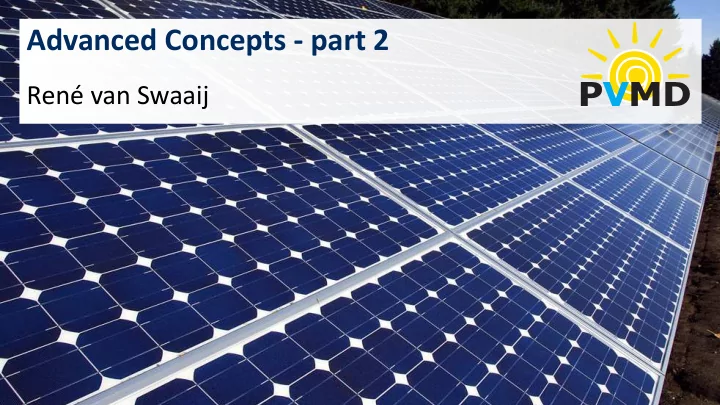

Advanced Concepts - part 2 René van Swaaij PVMD Delft University of Technology
Learning objectives • Advanced concepts based on crystalline silicon:
Learning objectives • Advanced concepts based on crystalline silicon: • Silicon heterojunction (HIT)
Learning objectives • Advanced concepts based on crystalline silicon: • Silicon heterojunction (HIT) • Inter-digitated back contacted (IBC)
Learning objectives • Advanced concepts based on crystalline silicon: • Silicon heterojunction (HIT) • Inter-digitated back contacted (IBC) • Top performance: IBC + HIT
Silicon heterojunction solar cells HIT: H eterojunction with I ntrinsic T hin layer Efficiency up to 25.6% Source figure: Sanyo (now Panasonic) Masuko et al., IEEE-JPV 4 , 1433- 1435 (2014)
Silicon heterojunction solar cells HIT: H eterojunction with I ntrinsic T hin layer 1. Random texture for light trapping Efficiency up to 25.6% Source figure: Sanyo (now Panasonic) Masuko et al., IEEE-JPV 4 , 1433- 1435 (2014)
Silicon heterojunction solar cells HIT: H eterojunction with I ntrinsic T hin layer 1. Random texture for light trapping 2. a-Si:H surface passivation Efficiency up to 25.6% Source figure: Sanyo (now Panasonic) Masuko et al., IEEE-JPV 4 , 1433- 1435 (2014)
Silicon heterojunction solar cells HIT: H eterojunction with I ntrinsic T hin layer 1. Random texture for light trapping 2. a-Si:H surface passivation 3. Bifacial design Efficiency up to 25.6% Source figure: Sanyo (now Panasonic) Masuko et al., IEEE-JPV 4 , 1433- 1435 (2014)
Silicon heterojunction solar cells HIT: H eterojunction with I ntrinsic T hin layer 1. Random texture for light trapping 2. a-Si:H surface passivation 3. Bifacial design 4. n-type c-Si: longer hole lifetimes Þ longer diffusion length Efficiency up to 25.6% Source figure: Sanyo (now Panasonic) Masuko et al., IEEE-JPV 4 , 1433- 1435 (2014)
Silicon heterojunction solar cells HIT: H eterojunction with I ntrinsic T hin layer 1. Random texture for light trapping 2. a-Si:H surface passivation 3. Bifacial design 4. n-type c-Si: longer hole lifetimes Þ longer diffusion length 5. Low cost and low temperature processing Efficiency up to 25.6% Source figure: Sanyo (now Panasonic) Masuko et al., IEEE-JPV 4 , 1433- 1435 (2014)
Interdigitated back-contacted (IBC) solar cell p n Efficiency up to 25.2% Source figure: Sunpower Werner T, Analyst Day, 12 November, 2015, Slide 24
Interdigitated back-contacted (IBC) solar cell 1. Random texture for light trapping 2. Oxide layer for surface passivation p n Efficiency up to 25.2% Source figure: Sunpower Werner T, Analyst Day, 12 November, 2015, Slide 24
Interdigitated back-contacted (IBC) solar cell 1. Random texture for light trapping 2. Oxide layer for surface passivation 3. All contacts at back to p n prevent shading Efficiency up to 25.2% Source figure: Sunpower Werner T, Analyst Day, 12 November, 2015, Slide 24
Interdigitated back-contacted (IBC) solar cell 1. Random texture for light trapping 2. Oxide layer for surface passivation 3. All contacts at back to p n prevent shading 4. Localized contacts: reduction recombination loss Efficiency up to 25.2% Source figure: Sunpower Werner T, Analyst Day, 12 November, 2015, Slide 24
Interdigitated back-contacted (IBC) solar cell 1. Random texture for light trapping 2. Oxide layer for surface passivation 3. All contacts at back to p n prevent shading 4. Localized contacts: reduction recombination loss Efficiency up to 25.2% 5. n-type c-Si: longer hole lifetimes Þ longer diffusion Source figure: Sunpower length Werner T, Analyst Day, 12 November, 2015, Slide 24
Interdigitated Back Contacted solar cell 1. Larger cross-section contacts since they are at the back
Interdigitated Back Contacted solar cell 1. Larger cross-section contacts since they are at the back 2. Area of p+ region larger due to diffusion length
Best of two worlds: IBC-HIT ARC a-Si:H passivation n-type c-Si i-a-Si:H p-a-Si:H / n-a-Si:H pattern Efficiency of 26.6% Kaneka Corporation, Nature Energy 2 , (2017)
Best of two worlds: IBC-HIT 1. Texture for light trapping ARC a-Si:H passivation n-type c-Si i-a-Si:H p-a-Si:H / n-a-Si:H pattern Efficiency of 26.6% Kaneka Corporation, Nature Energy 2 , (2017)
Best of two worlds: IBC-HIT 1. Texture for light trapping ARC a-Si:H passivation 2. a-Si:H surface passivation n-type c-Si i-a-Si:H p-a-Si:H / n-a-Si:H pattern Efficiency of 26.6% Kaneka Corporation, Nature Energy 2 , (2017)
Best of two worlds: IBC-HIT 1. Texture for light trapping ARC a-Si:H passivation 2. a-Si:H surface passivation 3. All contacts at back to prevent shading n-type c-Si i-a-Si:H p-a-Si:H / n-a-Si:H pattern Efficiency of 26.6% Kaneka Corporation, Nature Energy 2 , (2017)
Best of two worlds: IBC-HIT 1. Texture for light trapping ARC a-Si:H passivation 2. a-Si:H surface passivation 3. All contacts at back to prevent shading n-type c-Si 4. Localized contacts: reduction recombination loss i-a-Si:H p-a-Si:H / n-a-Si:H pattern Efficiency of 26.6% Kaneka Corporation, Nature Energy 2 , (2017)
Best of two worlds: IBC-HIT 1. Texture for light trapping ARC a-Si:H passivation 2. a-Si:H surface passivation 3. All contacts at back to prevent shading n-type c-Si 4. Localized contacts: reduction recombination loss i-a-Si:H 5. n-type c-Si: longer hole lifetimes Þ longer diffusion p-a-Si:H / n-a-Si:H pattern length Efficiency of 26.6% Kaneka Corporation, Nature Energy 2 , (2017)
Summary • Silicon heterojunction cell improves open circuit voltage
Summary • Silicon heterojunction cell improves open circuit voltage • IBC all contacts at the back to optimise absorption
Summary • Silicon heterojunction cell improves open circuit voltage • IBC all contacts at the back to optimise absorption • IBC + HIT combines the best of both worlds for record efficiencies
Recommend
More recommend